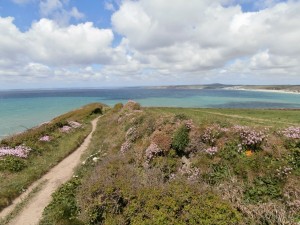Colette and I started walking the South West Coast Path nine years ago, from Poole in Dorset, and hope to reach Minehead in Somerset in about six years time. We just got back from Cornwall, having walked the 61 miles between Falmouth and Penzance. Such a lovely coast, full of amazing contrasts, from the quiet sheltered tidal creeks of the Helford River and Gillan Creek to the wild and windswept headlands of the Lizard. The abundance of wildflowers was such a joy!
Our impressions were of a well cared for landscape, where a lot of human effort, much of it voluntary, has been put into protecting the biodiversity and improving access. Of course damage can still occur in many ways, from the minor acts of individual stupidity like dropping litter or the illegal digging of bait on the tidal mudflats to more major threats like the proposal to re-open and enlarge the Dean Quarry near St Keverne. This quarrying expansion could bring economic benefits to the area, and the stone is destined for the planned Swansea Bay Tidal Lagoon, which is an excellent renewable energy project. However enlarging the quarry could destroy the wonderful corals of the newly established Manacles Marine Conservation Zone. The question is whether the quarry can be developed in such a way that it brings maximum benefits while minimizing damage. Other threats include the macro threats of climate change and ocean acidification, which are both largely driven by carbon emissions, and where it is of no consequence whether the carbon in emitted in Cornwall, Australia or China. Continuing to protect and develop this magnificent coast requires a huge range of action at all levels, from reducing the litter dropped by individuals, to the careful consultation on the quarry plans and the global transition to a low carbon economy.
There are some complex trade-offs in this process of environmental protection. If saving the Manacles Marine Conservation Zone jeopardizes the Swansea Bay Tidal Lagoon and then subsequent other tidal lagoons this might well slow the UK’s carbon reductions, with all the related damage this will do to ocean ecosystems and much else besides. I’ll write again soon about balancing the needs of the economy and ecology: potentially we can get the best of both worlds!
Manacles http://www.wildlifetrusts.org/MCZ/the-manacles
Quarryhttp://www.falmouthpacket.co.uk/news/12891072.Super_quarry_moves_a_step_closer/?ref=mr

